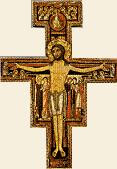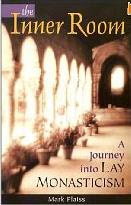
First and foremost in the heart of our Seraphic Father and all us is the love of Christ crucified. This love, however, has to be aided with a love for poverty for it to grow and mature. Hence we say that poverty together with love, constitute the essence of Franciscan spirituality. These elements cannot be separated because love of Christ cannot exist alone without poverty, and on the other hand, poverty alone is merely a negative virtue, a means, not an end. The purpose of our life is love, and thus poverty has no value except it be united with love.
We know that Saint Francis denied himself all things so that his entire love might be given to Love itself, and he did this ‘with his whole heart and soul, and with his whole strength.’ He realized that if he were in any way to give himself to a love other than the love of God, he would fall far short of his goal. Perfect Love will not allow itself to be divided.
Is the love of Christ and identification with Him, rightly called Christ–centered spirituality, the ultimate end of our endeavors as Franciscans? It is not, but only the proximate means to the ultimate end, the love of Infinite Love.
‘I am the way,’ Christ has told us. He was and is the way to the Father in the unity of Infinite Love.
What, then, constitutes Christ–centered Franciscan spirituality?
It is a combination of poverty and love, the means by which a Franciscan strives for a union with Infinite Love. By the detachment of oneself in all things, and by love of Christ crucified, he is transformed into Christ. In Christ, the Franciscan acquires His perfection, and he lives Christ's life. But this is done for one purpose only: that by loving Christ, he may be enabled to love the Father, and thus participate in a union with Infinite Love.
Saint Francis prays, ‘I beseech You O Lord, that the fiery and sweet strength of Holy Love, may absorb my mind from all things which are under Heaven, so that I may die for love of You Love, as You did demeaned Yourself to die for love of my love.’
Our Seraphic Father directed his love to the Incarnate and Crucified Love, so that this Love might lead him to the end he sought so tirelessly. ‘Through Him, with Him, and in Him,’ the Franciscan must work to acquire a participation in His life -- in the bosom of the Trinity, in the unity of Infinite Love. Then the heart, created for Infinite Love, may take its rest, for it has fulfilled its destiny. ‘You alone are Good, all Good, the Highest Good, the Lord God, living and true, You are charity, Love.’
 In Franciscan spirituality, the Incarnation is an important event. It is the great gift of the Most High Father of His Son, Jesus Christ who, out of Love, through His own poverty becomes One with us.
In Franciscan spirituality, the Incarnation is an important event. It is the great gift of the Most High Father of His Son, Jesus Christ who, out of Love, through His own poverty becomes One with us.































